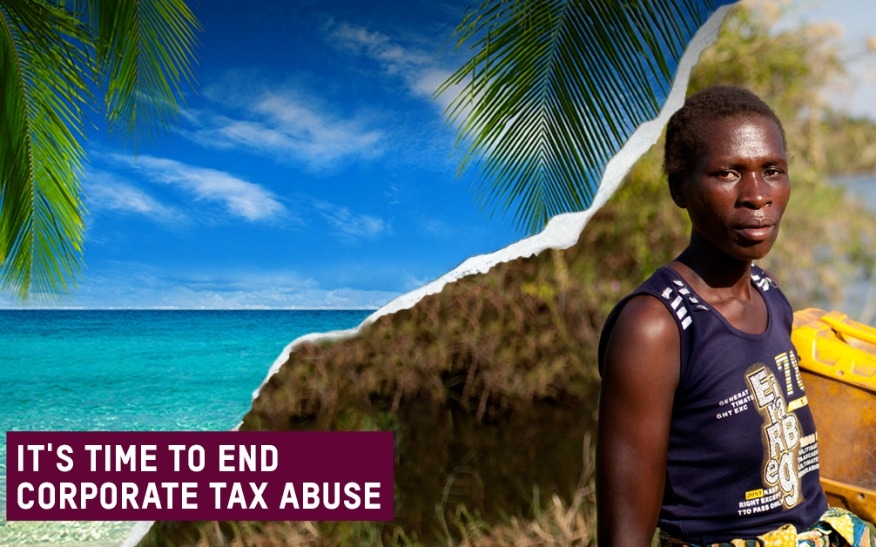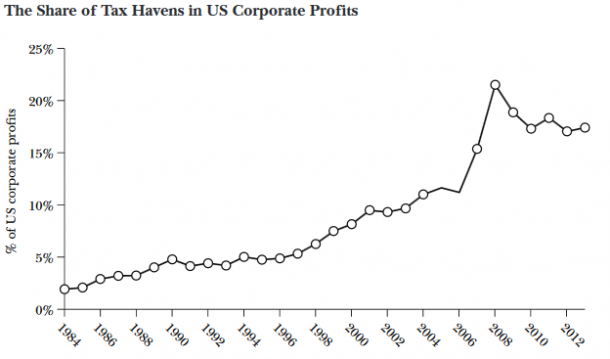Still crazy after all these years, or 50 ways to lower your taxes

We believe extreme inequality is not inevitable—it is the consequence of political choices.
Robbie Silverman is a Senior Advisor in Oxfam America’s Private Sector Department.
When Paul Simon crooned “Still crazy after all these years…” he probably wasn’t talking about the US tax system. But he could have been. In the last two weeks alone, we’ve seen the Panama Papers shine a floodlight into the darkest corners of international tax avoidance and Pfizer pull back from the biggest corporate inversion in history, a tax dodge that would have cost the US taxpayers $35 billion. These are just the latest in a seemingly endless parade of tax scandals that show just how crazy our tax system has become, where multinational corporations and rich individuals play by one set of rules and the rest of us suffer the consequences.
Today, Oxfam adds to the list of scandals. Not by uncovering secret documents, but by analyzing information that’s been hiding in plain sight. We studied the tax practices of the 50 largest US corporations using publicly available documents, most provided by the companies themselves in their public 10-K filings with the Securities Exchange Commission (SEC). We gave the companies every benefit of the doubt—we used their own data, we employed their own methodology to calculate their tax rates, and we crosschecked with the companies beforehand to ensure the accuracy of our information—and the results are still shocking.
Here are a few of the eye-popping—and head-splitting—results:
- The 50 biggest US companies have stashed $1.4 trillion offshore. This is more than the entire GDP of countries like Spain, Mexico, and Australia.
- The 50 biggest US companies use more than 1,600 subsidiaries in tax havens.
- Using their own data (likely a substantial overestimate), companies pay an effective tax rate of 26.5 percent, well below the statutory rate of 35 percent and the average tax rate of 31.5 percent that US workers pay.
- The US alone loses an estimated $100 billion each year as a result of corporate tax dodging—the average American taxpayer would have to shell out $760 to cover this gap.
- Poor countries lose an estimated $100 billion a year to corporate tax dodgers. This is enough to provide safe water and sanitation to more than 2.2 billion people.
- From 2008 to 2014, even as they avoided more than $337 billion in taxes, the 50 largest US companies collectively received $11.2 trillion in federal loans, loan guarantees, and bailouts. In other words they received $27 in federal loan support for every $1 they paid in federal taxes.
Tax havens—secretive, offshore jurisdictions that charge little or no tax and require little or no disclosure—are at the heart of the rigged global tax system, as the Panama Papers leak makes clear. Rampant tax dodging using offshore havens allows large corporations to avoid paying their fair share, depriving governments—developed and developing—of the resources they need to provide vital public services like education and healthcare that are the best tools to address poverty.
This rigged system has helped fuel runaway global inequality, where only 62 individuals own as much as 3.6 billion people, and where the wealth of the richest 1 percent surpasses the combined wealth of the rest of the world, as Oxfam reported back in January.
Unfortunately, the problem is getting worse, not better. University of California Berkeley economist Gabriel Zucman estimates that the share of total corporate profits US companies report in tax havens has increased tenfold since the mid-1980s. In one recent year, US companies moved about $700 billon—$1 out of every $4 they make in profits—from the locations where those profits were really earned to lower tax jurisdictions.

The irony is that big multinationals should understand better than almost anyone why an adequately funded federal government is beneficial to our economy and to corporate bottom lines. As the new Oxfam report points out, the biggest US companies are among the largest beneficiaries of taxpayer funded support. They also understand the value of political influence. The companies spent a combined $2.6 billion on federal lobbying between 2008 and 2014. For every $1 they invested in lobbying, they received $130 in federal tax breaks and more than $4,000 in federal loan support.

What can we do to stop this race to the bottom? First and foremost, we need policymakers to step up. Congress must pass the Stop Tax Haven Abuse Act, which will require greater tax transparency and close loopholes that allow US multinationals to dodge paying their fair share. President Obama must lead efforts to foster greater international coordination on tax to create a fairer and more effective tax system that works for everyone, not just the rich and powerful.
But forward-looking companies don’t need to wait for policy change to take positive steps on tax. Oxfam, in partnership with ActionAid and Christian Aid, recently published a comprehensive set of steps that corporations can take to act responsibly on tax. These recommendations have three overarching principles:
- Companies should be fully transparent about their business operations and tax practices, by publicly reporting their revenue, profits, taxes paid, list of subsidiaries, number of employees, and other key financial metrics for every country in which they do business.
- Companies should end the corporate abuse of tax havens and pay taxes where their actual economic takes place.
- Companies should use their considerable political influence to push for a more level playing field on tax, rather than trying to rig the rules for their own private gain.
We believe extreme inequality is not inevitable—it is the consequence of political choices. Globally, as well as here at home, we need political and economic reform to level the playing field. Focusing on ending the era of tax havens is a good place to start.